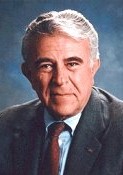|
Press Release of Rep.
Benjamin Gilman (R-NY).
Re: Opening statement regarding HR 850, SAFE Act.
Hearing of the House Subcommittee on International Economic Policy and Trade.
Date: May 18, 1999.
Source: House International Relations Committee. This document was created by scanning a
fax copy, and converting to HTML. |
 |
|
GILMAN WARNS THAT "SAFE ACT" WOULD MAKE
ENCRYPTION AVAILABLE TO U.S. ADVERSARIES
CITES POLICE ASSOCIATION STATEMENT ON DANGER TO LAW ENFORCEMENT
WASHINGTON (May 18) - U.S. Rep. Benjamin A. Gilman (20th-NY), Chairman of the House
International Relations Committee, urged his colleagues not to "rush to
judgment" in favor of the so-called "SAFE Act," which would deregulate the
export of U.S. encryption software, at a subcommittee hearing today.
"I am very concerned that the enactment of the SAFE Act would make strong
encryption all the more available to our adversaries and would only undermine
international efforts to modernize and improve multilateral export controls under the
Wassenaar Arrangement," Gilman told his colleagues.
Gilman's statement came at a hearing on "Encryption: Security in a High Tech
Era" held by the Subcommittee on International Economic Policy and Trade. Gilman's
full statement follows:
"In my view, before we begin the process of making sweeping changes in our
encryption export control laws, Congress should get all the information we can in all the
venues available to us. With the U.S. participating in a NATO-led military operation
against Serbia, we should be doubly cautious in this respect because of the possibility of
terrorists attacks against U.S. interests.
"I am very concerned that the enactment of the SAFE Act would make strong
encryption all the more available to our adversaries and would only undermine
international efforts to modernize and improve multilateral export controls under the
Wassenaar Arrangement.
"I draw the attention of Subcommittee members to the recent statement of the
International Association of Chiefs of Police that the 'unchecked proliferation of
encryption technology poses an enormous danger to both law enforcement and to society as a
whole.'
"In a May 12 letter I received from B'nai B'rith International, its President
Richard Heideman noted that the 'unlimited proliferation of non-recoverable encryption
products may result in their use by terrorist groups, narcotics traffickers, members of
organized crime and other dangerous criminals to the detriment of United States national
security and public safety.'
"Mr. Heideman concluded that his organization has 'strong reservations about the
Security and Freedom through Encryption Act' and urges that Congress maintain meaningful
export safeguards.
"Unlimited proliferation of this technology only makes the street corner drug
dealer further immune from the consequences of his and others' actions. The drug trade
costs us billions each year in crime, health care costs, lost worker productivity and
destroyed families and lost young lives. Let us not contribute to this carnage under the
guise of promoting trade and commerce.
"For those who say that this encryption technology is already easily available
abroad, they often fail to remind you that the foreign governments in such cases have also
retained the right to access in protection of their own national security interests. These
governments are not naive, and we shouldn't be either.
"While we are still waiting for the final version of the Cox Report on our
high-tech exports to China, many of their recommendations are already public. Among them
are concrete suggestions on how to strengthen the successor regime to the Cold War Cocom
export system. Its modem day equivalent, the so-called Wassenaar Arrangement, has just
agreed to modernize our multilateral encryption export control system. Yet the enactment
of the SAFE Act would undercut this arrangement -- and the findings of the Cox Report.
"I would urge my colleagues not to rush to judgement on an issue such as this
which directly affects our national security and law enforcement needs. Thank you."
